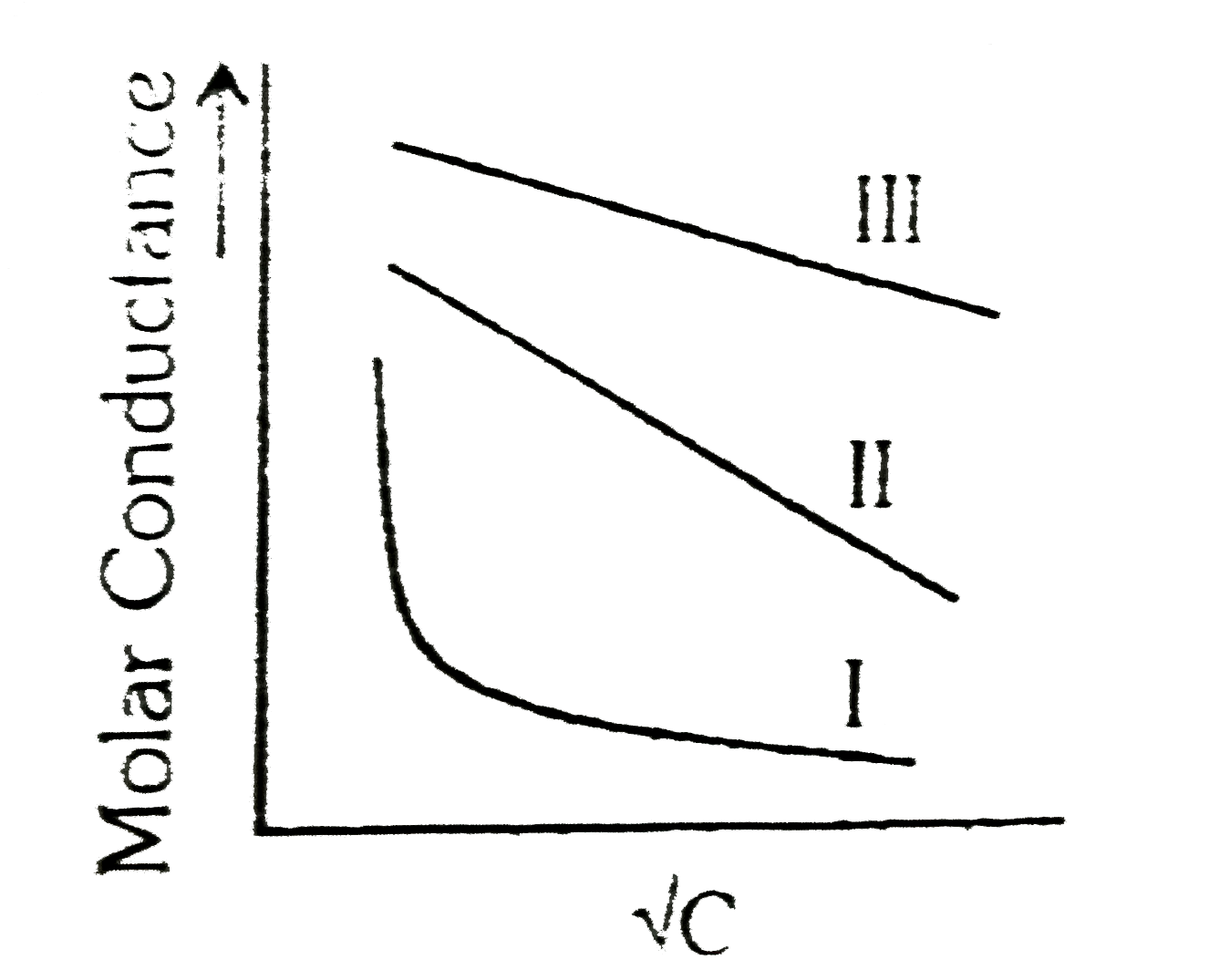The molar conductivity of strong electrolyte
Increases on dilution slightly
Does not change on dilution
Decreases on dilution
Depends on density of electrolyte itself
The correct Answer is:A
To solve the question regarding the molar conductivity of a strong electrolyte, we will analyze the options provided and apply the relevant concepts from electrochemistry.
1. Understanding Molar Conductivity:
Molar conductivity (Λ) is defined as the conductivity (κ) of an electrolyte solution divided by its molar concentration (C). It is expressed as:
Λ=κC
For strong electrolytes, which completely dissociate into ions in solution, the behavior of molar conductivity with dilution is crucial.
2. Effect of Dilution on Strong Electrolytes:
When a strong electrolyte is diluted, the concentration of ions in the solution decreases. However, the degree of ionization increases as the solution becomes more dilute. This is due to the increased distance between ions, which reduces ion-ion interactions and allows for greater mobility.
3. Ionic Mobility:
As the solution is diluted, the volume of the solution increases, and the ionic mobility of the ions also increases. Ionic mobility is the ability of ions to move through the solution under the influence of an electric field.
4. Change in Molar Conductivity:
The increase in ionic mobility leads to an increase in molar conductivity. Therefore, as the solution is diluted, the molar conductivity of a strong electrolyte increases slightly.
5. Evaluating the Options:
- Option A: Increases on dilution slightly - This is correct as explained above.
- Option B: Does not change on dilution - This is incorrect because molar conductivity does change.
- Option C: Decreases on dilution - This is incorrect for strong electrolytes as their molar conductivity increases.
- Option D: Depends on the density of the electrolyte itself - This is also incorrect as molar conductivity primarily depends on ion mobility and concentration, not density.
6. Conclusion:
Based on the analysis, the correct answer is Option A: "Increases on dilution slightly".
Molar conductivity (Λ) is defined as the conductivity (κ) of an electrolyte solution divided by its molar concentration (C). It is expressed as:
Λ=κC
For strong electrolytes, which completely dissociate into ions in solution, the behavior of molar conductivity with dilution is crucial.
When a strong electrolyte is diluted, the concentration of ions in the solution decreases. However, the degree of ionization increases as the solution becomes more dilute. This is due to the increased distance between ions, which reduces ion-ion interactions and allows for greater mobility.
As the solution is diluted, the volume of the solution increases, and the ionic mobility of the ions also increases. Ionic mobility is the ability of ions to move through the solution under the influence of an electric field.
The increase in ionic mobility leads to an increase in molar conductivity. Therefore, as the solution is diluted, the molar conductivity of a strong electrolyte increases slightly.
- Option A: Increases on dilution slightly - This is correct as explained above.
- Option B: Does not change on dilution - This is incorrect because molar conductivity does change.
- Option C: Decreases on dilution - This is incorrect for strong electrolytes as their molar conductivity increases.
- Option D: Depends on the density of the electrolyte itself - This is also incorrect as molar conductivity primarily depends on ion mobility and concentration, not density.
Based on the analysis, the correct answer is Option A: "Increases on dilution slightly".
Similar Questions
Knowledge Check
Assertion:Kohlrausch law helps to find the molar conductivity of weak electrolyte at infinite dilution.
Reason:Molar conductivity of a weak electrolyte at infinite dilution cannot be determined experimentally.AIf both assertion and reason are true and reason is the correct explanation of assertion .BIf both assertion and reason are true but reason is not the correct explanation of assertion .CIf assertion is true but reason is false .DIf both assertion and reason are false .
Resistivity is reciprocal of molar conductivity of electrolyte.
View SolutionWrite points of difference between :
(i) conductance and conductivity
(ii) strong electrolytes and weak electrolytes.
View SolutionWhat is the effect of decreasing concentration on the molar conductivity of a weak electrolyte?
View SolutionStatement-I: Molar conductivity of a weak electrolyte at infinite dilution cannot be determined experimenttally.
Because Statement-II: Kohlrausch law help to find the moar conductivity of a weak electrolyte at infinite dilution.
View SolutionSTATEMENT 1 The molar conductance of weak electrolyte at infinite dilutin is equal to sum of molar conductanced of cation and anion and
STATEMENT 2 Kohlraushc 's law is applicable for both strong and weak electrolytes
View SolutionA graph was plotted between the molar conductance of various electrolytes (HCI,KCI and CH3COOH) and root of their concentrations in molar per litre.

Which of the following is correct match?
View SolutionHow does temperature affect the electrical conductivity of electrolytes ?
View Solution
